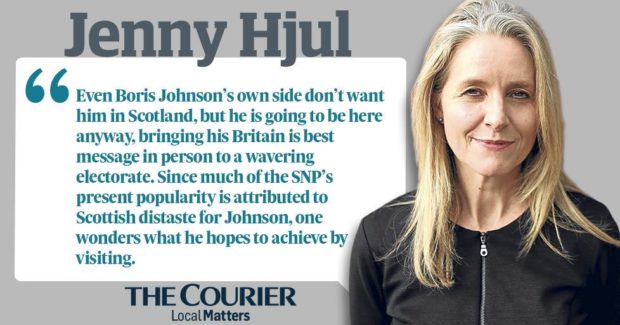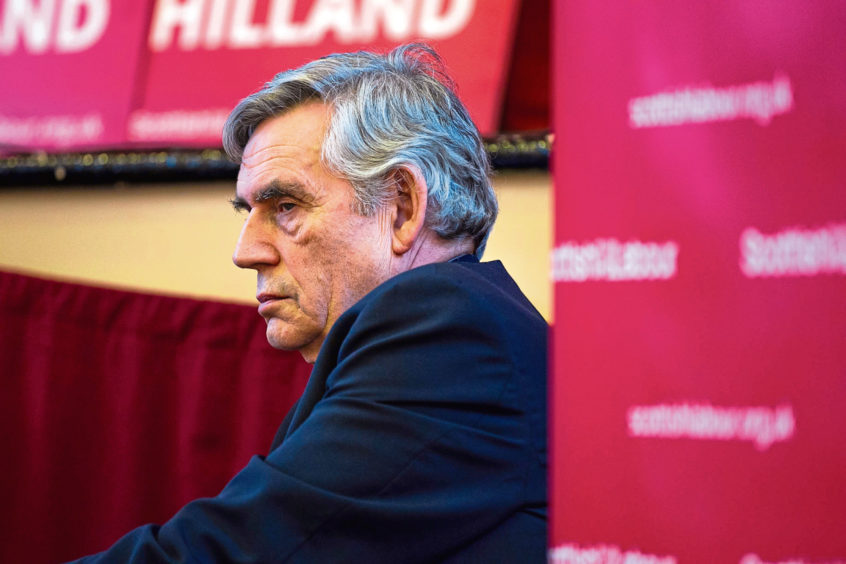Scots are probably more inclined to listen to the advice of former prime minister Gordon Brown than to anything the current PM has to say.
But though both are within our orbit this week, neither premier seems to have much in the way of a plan to safeguard the union against rampant Scottish nationalism.
Brown, in proposals outlined on Monday, warned that the UK was doomed to fail unless it was reformed.
His big idea is to replace the House of Lords with a “senate of the regions” that would address potential constitutional upheaval, not just in Scotland, but in Wales and Northern Ireland, and also mollify the metro mayors of the north. There may be merit in devolving more power away from an “insensitive, out-of-touch and overcentralised” centre, but Brown’s is a long-term solution to a problem which, in Scotland at least, is immediate.
Our elections are in May and polling points to a triumph for the SNP, which the party will exploit to further independence. There’s nothing new in that, of course, except that this time they mean to use their expected majority as a mandate for staging a second referendum.
As spelled out by constitution minister Mike Russell over the weekend, their road map threatens a court battle if Westminster continues to flout SNP ambitions by refusing another plebiscite.
“What is absolutely not for discussion is the fact that if Scotland votes for a legal referendum on May 6 this year, that is what it will get,” he said.
Trying to turn spring’s parliamentary ballot into a decision on separation should surely scare away all but the most diehard secessionists. With Scotland yet to emerge from the pandemic, the economic outlook precarious and the impact of Brexit still unfolding, there could not be a worse time to cut ties with the rest of Britain.
SNP support is solid
But opinion polls suggest that SNP support is solid, and while the last couple of surveys have shown a slight swing in the other direction, the momentum remains with the nationalists.
There is no time to lose and certainly no time to implement Brown’s lofty blueprint. A far smarter strategy to beat the SNP is to unite all opposition forces, as happened in 2014 when “Better Together” defeated the “Yes” movement by a convincing margin.
Brown won’t join such an alliance, though. He was late to the party six years ago when the crossbench personalities were far more plausible bedfellows (Alistair Darling, David Cameron, Nick Clegg) and he certainly won’t be drawn into any pact while Boris Johnson is the Tory leader.
That’s hardly surprising when even Johnson’s own side don’t want him in Scotland. Nevertheless, he is going to be here anyway tomorrow, bringing his “Britain is best message” in person to a wavering electorate.
A burst of Boris may not help
Since much of the SNP’s present popularity, and particularly Nicola Sturgeon’s, is attributed to Scottish distaste for Johnson, one wonders what he hopes to achieve by visiting. But unionists must not despair. While a burst of Boris might not advance the cause, there are now, belatedly, successes being notched up on his watch that could just unsteady the nats.
These victories are all in the fight against coronavirus which, despite the SNP’s preoccupation with independence, remains the chief priority for most people. The gap that has opened up in the past week between Scotland and England in the delivery of vaccines has exposed a big chink in the nationalist armour.
However Sturgeon attempts to downplay Scotland’s poor vaccine roll-out, people here, especially those most in need of the jab, will be looking south and asking why their government has let them down.
Imagine this scenario
On Monday, when Sturgeon announced Scotland’s worst day yet for vaccinations, Johnson was beginning to flag up the possibility of easing some restrictions in England. Imagine a scenario whereby the inoculated populations of, say, Manchester and Newcastle, are freed from lockdown while Scotland is being told to stay at home because of Bute House’s bureaucratic bungling.
Once public trust in the SNP’s competence is lost, it will harder for nationalists to spread the lie that an independent Scotland could have suppressed the virus.
Covid has made the case for the union more effectively than any politician. British science produced the cure, in the shape of the Oxford vaccine, and British funds (and foresight) bulk bought the doses, for the whole of Britain, Scotland included. The British purse bankrolled almost 900,000 Scots in the furlough scheme, and will be the bedrock for our eventual recovery.
The rest of the UK will be the main market for our exports (as it was before Brexit) and a significant source of our rehabilitation.
Scotland needs neither Gordon Brown nor Boris Johnson to remind it of the dangers of breaking up Britain. The pandemic has done the job for them.



